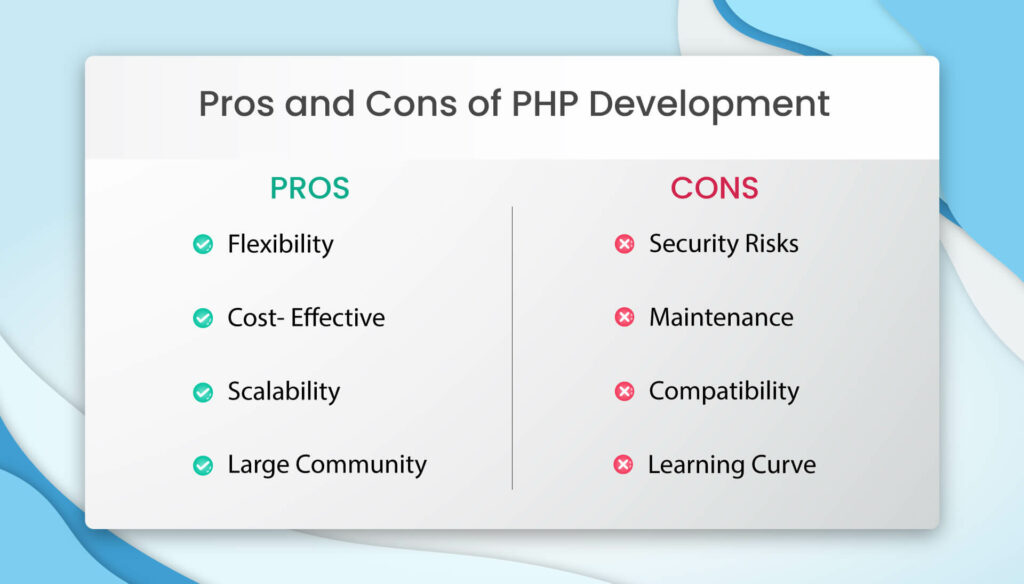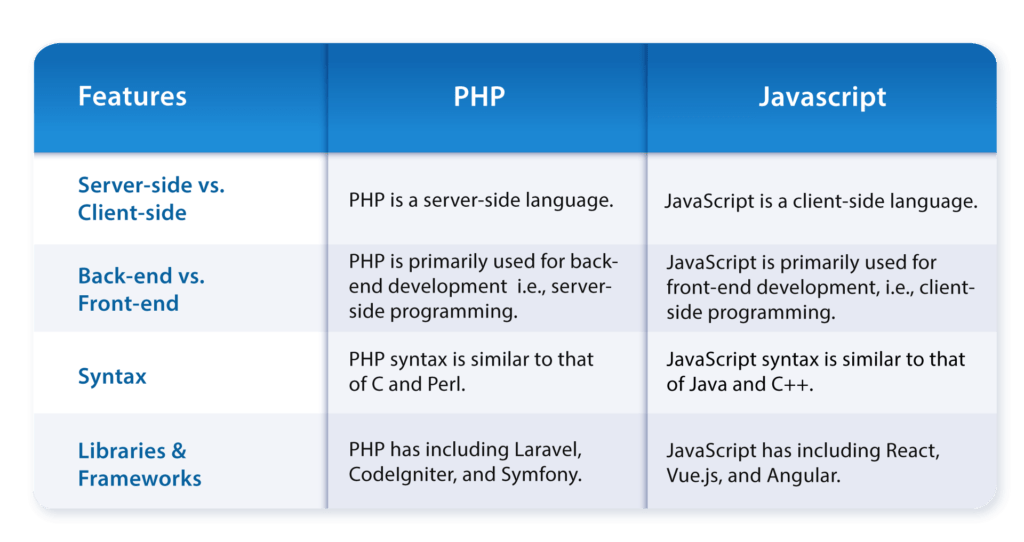Custom Software Development using PHP
PHP is a server-side scripting language used for web development . This language was created in 1994 by Rasmus Lerdorf. Web servers run or execute PHP projects. Developers generally use PHP for dynamic web pages, enabling the creation of websites that can change content and functionality according to requirements.

PHP is an open-source language, meaning anyone can use it and contribute to its development. This has led to a large and active community of developers who have created various libraries, frameworks, and tools that make it easier to develop and maintain PHP applications. These resources have helped make PHP even more accessible to developers, especially those new to the language.
It is versatile and can be used for many tasks beyond PHP web development. It can be used for command-line scripting, creating desktop applications, and even running on embedded systems. PHP can also interact with many languages, such as Java, Python, and C++, making it an excellent tool for integrating different systems.
PHP is also highly customizable. Developers can create custom extensions and modules to add new functionality to the language. This makes it possible to create complex web applications that can perform a wide range of tasks.
Now that you know what PHP is. Let’s discuss in detail What are PHP pros and cons for using it in custom software development and Why use PHP for web development.
Custom PHP Development: Pros & Cons
Like any development approach, there are pros and cons when opting for custom PHP development. Here are some of the key advantages and disadvantages:

Pros of Custom PHP Development :
Flexibility: One of the significant advantages of custom PHP development is its flexibility. PHP is an open-source programming language, which means developers can modify their code to fit specific project requirements. This flexibility allows the creation of unique and customized web applications that meet clients’ needs.
Cost-Effective: Another benefit of PHP web development is its cost-effectiveness. Since PHP is an open-source programming language, it is freely available, and developers can use it without licensing fees. This reduces development costs, saving clients money on their project budgets.
Scalability: PHP is a highly scalable programming language, making it an ideal choice for web applications that need to handle high traffic volumes. With custom development using PHP, developers can create web applications that can easily accommodate growth and expansion in the future.
Large Community: PHP has a vast developer community constantly contributes to its growth and development. This community provides support, resources, and tools to PHP developers, making creating high-quality web applications easier.
Cons of Custom PHP Development :
Security Risks: Custom PHP development can be prone to security risks, especially if developers are not knowledgeable about security best practices. This is because PHP is an open-source programming language, making it easy for attackers to find and exploit the code’s vulnerabilities.
Maintenance: Maintaining custom PHP applications can be challenging since they require regular updates and security patches. This can be time-consuming and costly for clients, especially if they lack the technical expertise.
Compatibility: PHP applications may not be compatible with all web servers or platforms, which can limit their functionality. This may require additional development work to ensure compatibility with different environments.
Learning Curve: PHP has a steep learning curve, making it challenging for developers unfamiliar with the language. This may increase PHP app development time and costs, as developers need to spend time learning and mastering the language.
Difference between PHP & JavaScript

PHP is the server-side scripting language. It is embedded with HTML and executes on the server to create dynamic web pages and handle server-side tasks. Javascript is the client-side scripting language used for enhancing interactivity, form validation.
Server-side vs. Client-side:
One of the main differences between PHP and JavaScript is that PHP is a server-side language, while JavaScript is a client-side language. The server executes PHP before sending the page to the browser, while the client side, i.e., the browser itself, executes JavaScript.
Back-end vs. Front-end:
Another difference is that PHP is primarily used for back-end development, i.e., server-side PHP programming, whereas JavaScript is primarily used for front-end development, i.e., client-side programming. PHP handles server-side tasks such as processing form data, interacting with databases, and generating dynamic web content. On the other hand, developers use JavaScript to create interactive web interfaces, manage user events, and manipulate the HTML and CSS of a web page.
Syntax:
PHP syntax is similar to that of C and Perl, while JavaScript syntax is similar to that of Java and C++. Both languages use different syntax structures, which require different programming practices.
Libraries and frameworks:
PHP has many frameworks and libraries, including Laravel, CodeIgniter, and Symfony. JavaScript has many popular libraries and frameworks, including React, Vue.js, and Angular.
PHP Application Development: Use Cases
PHP is the open-source scripting language used for web development. It provides various features and capabilities to meet the needs of different use cases.
Content Management Systems (CMS):
PHP is widely used for building CMS like WordPress, Drupal, Joomla, and many more. These CMS allow non-technical users to create, manage, and publish content on their websites without requiring programming knowledge.
E-commerce Websites:
Developers use PHP to create robust and scalable e-commerce websites such as Magento, Shopify, and WooCommerce. These websites have features like product catalogs, shopping carts, payment gateways, and order management systems.
Social Networking Platforms:
PHP is used for creating social networking platforms like Facebook, LinkedIn, and Twitter. These platforms allow users to connect, share content, and communicate with each other.
Web Applications:
Developers use PHP to develop various web applications, including webmail clients, project management systems, customer relationship management (CRM) systems, online calendars, and chat applications.
APIs Development:
PHP enables developers to build web and mobile application APIs, allowing them to interact with other web services and applications.
Mobile Application Backends:
PHP can be used as a back-end language for mobile applications, allowing them to communicate with web services and databases.
Real-time Web Applications:
PHP can be used for creating real-time web applications using technologies like WebSocket, enabling applications to communicate in real time with servers.
Benefits of using PHP
There are several benefits of PHP. Let’s see in detail why to use PHP for web development.
Easy Access:
PHP is an open-source programming language that is free to use and widely available. Developers can easily access the language and its resources, including frameworks, libraries, and documentation.
SEO-Friendly:
PHP is SEO-friendly because it generates clean URLs, meta tags, and other essential on-page SEO elements. This makes PHP websites more accessible to search engine crawlers, resulting in better rankings.
Centralized Database:
PHP allows businesses to connect to multiple databases, including MySQL, Oracle, and Microsoft SQL Server, to centralize and manage their data more efficiently.
Web Performance:
PHP is a lightweight programming language that offers fast page load times, high processing speeds, and reduced server workload, leading to better web performance.
Frequent Version Updates:
PHP constantly updates new versions, offering developers and businesses improved performance, security, and additional features.
Database Connectivity Flexibility:
PHP allows for easy connectivity with various databases and offers powerful data management features such as handling database transactions and optimizing queries.
User Design & Approach:
With its versatile and flexible design approaches, PHP allows developers to create visually appealing websites and applications.
Documentation:
PHP offers extensive documentation and support, making it easy for developers to learn and use the language effectively.
Security:
PHP offers built-in security features like session management, input validation, and encryption, making it a secure language for PHP web development.
Why PHP for your next project?

PHP (Hypertext Preprocessor) is a widely used server-side scripting language for over two decades. While several programming languages are available for web development, PHP continues to be a popular choice for many developers and organizations.
Here are some reasons why you might consider using PHP for your next project:
Easy to learn: PHP is relatively easy to learn and has a simpler syntax than other programming languages. This makes it a good choice for beginners just starting with web development.
Large community: PHP has a large and active community of developers, which means plenty of resources are available online to help you with any issues you might encounter. This also means that there are many pre-built libraries and frameworks that you can use to speed up your development process.
Wide range of frameworks: There are many popular PHP frameworks available such as Laravel, Symfony, CodeIgniter, and CakePHP, that can help you build web applications quickly and easily.
Good performance: PHP is a fast and efficient language that can easily handle high-traffic websites and applications.
Cross-platform compatibility: PHP is compatible with multiple platforms, including Windows, Linux, and macOS, which makes it easy to deploy your application on a variety of servers.
Large codebase: There is a large amount of code written in PHP that you can use as a reference or integrate into your projects.
Database integration: PHP has excellent support for databases such as MySQL, PostgreSQL, and Oracle, which makes it easy to build dynamic websites and applications that require database integration.
Conclusion
PHP programming language is versatile and can be used to build many web applications. Its ease of use, large community, wide range of frameworks, good performance, cross-platform compatibility, large codebase, and excellent database integration make it a popular choice among developers.
One of the critical advantages of PHP is its ease of use. Its simple syntax makes learning easy, which is excellent for beginners just starting with web development. Additionally, the large community of developers who use PHP means that many resources are available online to help you with any issues.
For any questions and inquiries, visit us at thinkitive





Great post! We are linking to this particularly great article on our site. Keep up the good writing.
Everyone loves what you guys are usually up too.
This kind of clever work and exposure! Keep up the amazing works guys I’ve you guys to
blogroll.